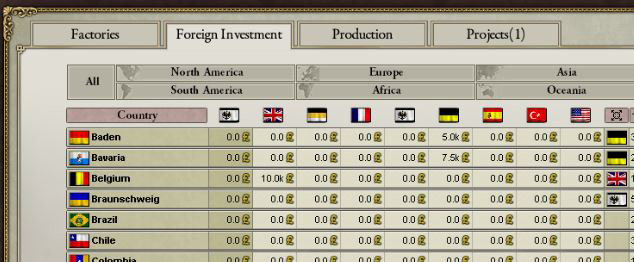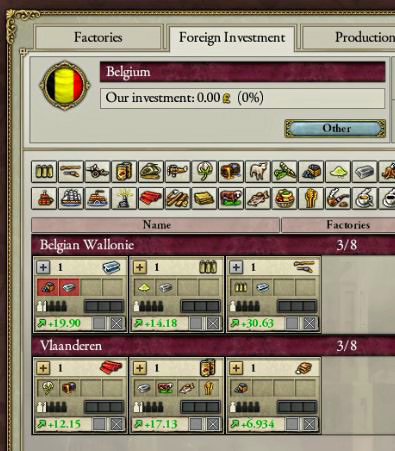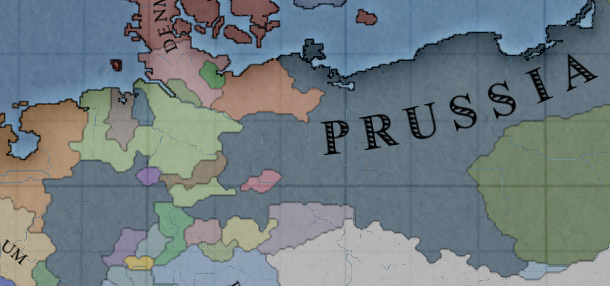In other words, it allows you to establish a global empire without war (and the infamy that comes with it) by investing in other countries and developing their industry and infrastructure. As long as you build your economy around it, then foreign investment will also be very profitable.
How The Numbers Work
You gain Foreign Investment by spending money, simple as that. As long as you have the cash, you can keep spending: there is no per-country limit. The game tracks how much each Great Power has spent, and the benefits you get in a nation are relative to your share in that nation. This means that you usually want to be the top investor in countries you care about. Let’s take a close look at the effects of Foreign Investment:
You gain exclusive access to the market of the nation receiving the investment. More precisely, a portion of each industrialized nation’s market is reserved to its sphere master (75% for most countries, 50% for secondary powers). The rest is divided among Great Powers based on their share of Foreign Investment. It makes it harder to sphere the nation for others. If you are the only investor, other Great Powers will receive a 50% penalty to their influence. Otherwise, the penalty will be applied proportionally, so having the largest share will make it almost impossible for another Great Power to sphere the country. You get a small amount of industrial power, contributing to your overall score. It’s less than you would get by building those factories in the homeland, but it can help you keep Great Power status.
Provided you are unopposed (and the AI generally shies away from confronting other Great Powers with massive Foreign Investment of its own) you can get a lot of perks almost for free.
The Drawbacks of Foreign Investment
Like all investments, Foreign Investment carries risks that range from minor drawbacks to strategic considerations This is due to you not having control over factories and the AI not caring about what happens to them. And can you blame it? These shiny new toys were not built on its nation’s dime. Here’s a list of what could go wrong:
Factories shutting down and being destroyed, for whatever reason, will result in the precious money you spent on them vanishing into thin air. It is random, and something will inevitably be lost. Secondary Powers seizing the means of production can remove all foreign investment by decision. Even worse, Great Powers do this automatically: investing in powerful nations carries a greater risk. Soft power is no replacement for hard power: should Prussia or France come knocking with hundreds of thousands of men, good standing with small nations won’t help, and losing Great Power status means losing all your Foreign Investment. Finally, the least obvious and most insidious drawback is the opportunity cost: every single red cent spent in far-flung satellite states could have been invested back home in railroads, naval bases, and factories for more industrial power and less risk.
Foreign Investment: Strategy Tips
Having covered the fundamentals, it’s clear that Foreign Investment is not always the best tool to choose. But it is one to keep in mind. Let’s see when it is definitely worth using:
If you plan to form a cultural union, such as Italy or Germany, you will eventually own several states of your culture. Hence, the industries you build to get local powers in your sphere of influence will become yours and bring their full benefits. If you already sphered a small nation, the other Great Powers won’t usually go after it. With a token investment, you can get full, exclusive access to the last 25% of its market.
In all other cases, if you have a large pile of cash just sitting there, it means you are either over-taxing your citizens or under-spending in fields such as education, administration, and the military. As satisfying as a million pounds looks in the budget menu, money not spent is money not generating revenue. For the next list below, Foreign Investment should not be your only option, but it can help:
Strengthen your home industry by providing manufactured goods your factories need. You will gain clout with that nation and expand your production without spreading your workforce too thin. Generally, these are glass and cloth factories Keep your Great Power status. Foreign factories add up and increase your score. Especially when going tall, Foreign Investments is much more sustainable than increasing prestige only, but always be wary of military powers and protect yourself through alliances. Create a healthy economy. Rich countries breed rich POPs, and rich POPs in your sphere of influence can buy more goods from your factories.
And with these tips, you now know when Foreign Investment is a great idea and when you should at least consider it to increase your soft power.



